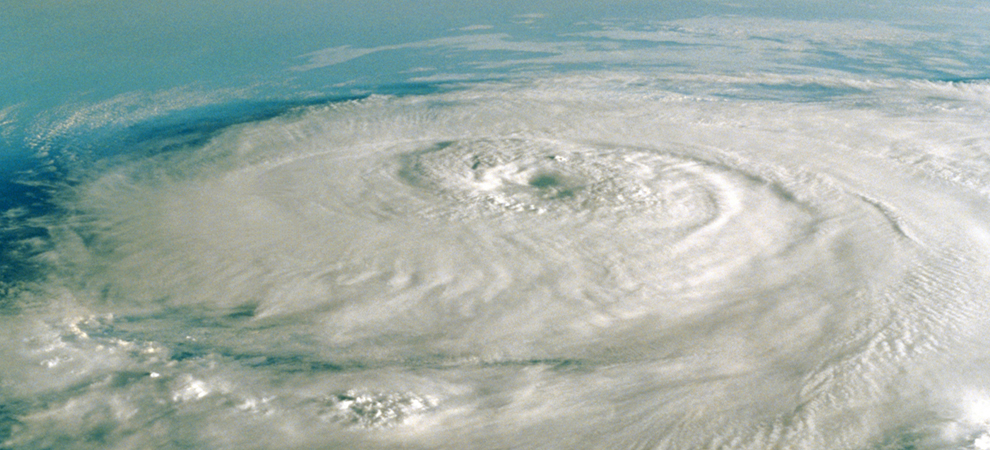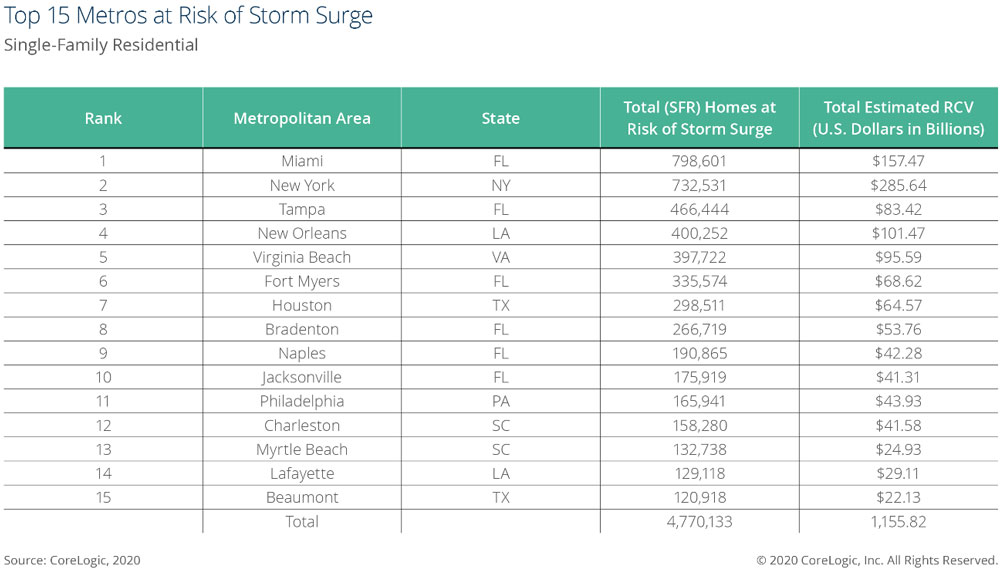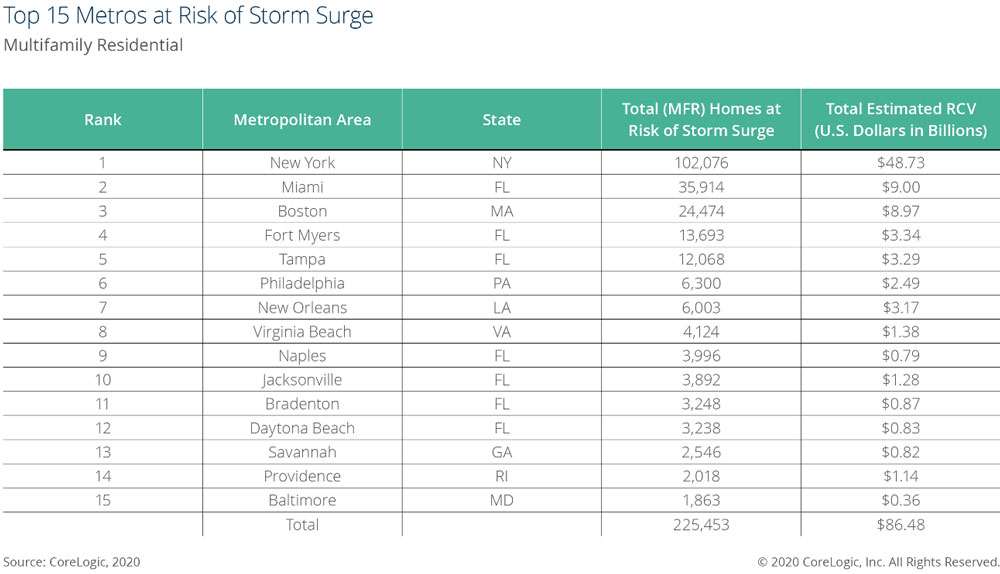The WPJ
THE WORLD PROPERTY JOURNALReal Estate Facts Not Fiction
Residential Real Estate News

As Hurricane Season Kicks Off in US, 7.4 Million Coastal Homes at Risk of Storm Surge Damage
Residential News » Miami Edition | By Michael Gerrity | May 29, 2020 9:00 AM ET
Over $1.8 trillion in combined reconstruction cost value are at risk of storm surge
Based on CoreLogic's newly released 2020 CoreLogic Storm Surge Report, nearly 7.4 million single- and multifamily homes in the U.S. with more than $1.8 trillion in combined reconstruction cost value are at risk of storm surge and possible mandatory evacuation in the midst of a global pandemic.
With the Atlantic hurricane season officially starting on June 1, many states are still under stay-at-home orders or strict social distancing guidelines - causing economic stress on housing and forcing communities to develop new logistical measures to recover from natural catastrophes. This year's analysis outlines these operational ramifications, the economic recovery challenges exasperated by the virus, and shares ways to get ahead of what is potentially to come.
This hurricane season begins as the economy struggles, with an unemployment rate that has exceeded 14% in April 2020, and cities at high risk of storm surge damage also face risk of mortgage delinquencies. Miami (5.1%), New York (4.7%) and New Orleans (6%) had elevated mortgage delinquency rates in February, well above the U.S. rate (3.6%) and two months ahead of the spike in U.S. unemployment. Miami, New York and New Orleans are also near the top of the list for storm surge risk, ranking first, second and fourth, respectively, for risk to single family homes. "If a hurricane causes significant storm surge damage during a time when mortgage delinquencies are already high, this could result in additional losses for homeowners, lenders and insurers - and ultimately, delay economic recovery for impacted communities," said Dr. Frank Nothaft, chief economist at CoreLogic. "For example, our analysis shows that three months after 2018's Hurricane Florence made landfall, serious delinquency rates had doubled in major metros affected by the storm."
"Storm surge has historically been the deadliest and most destructive hazard we deal with," said Dr. Thomas Jeffery, Principal, Science and Analytics at CoreLogic. "Now, with hurricane preparedness and response logistics potentially compounded by the pandemic, it has never been more important to pay attention to storm warnings and prepare for the possibility of hurricanes making landfall this year along the Gulf and Atlantic coasts."
Challenges caused by COVID-19
This year, preparation, evacuation, and response to hurricane season will look far different than the average year. As of May 28, New Jersey is still under a shelter-in-place order, with states such as New York, Maine and Virginia only beginning regional reopening. Experts caution that social distancing measures will continue throughout the summer and fall. The report outlines recommended solutions for challenges brought on by the pandemic, including how to practice social distancing during an evacuation and assess the resulting storm damage using virtual and geospatial solutions.
"Insurance companies can be the source that connects many of these solutions providers, such as construction companies and hotels, that can assist people impacted by hurricanes," James R. Swayze, Executive, Insurance Claims at CoreLogic says. "The key to ensuring a speedy recovery in the face of new COVID-19-created challenges is insurance companies' use of virtual assessment and claims tools. Creating a faster and more efficient claims process can help alleviate other community-wide disruptions."
Based on CoreLogic's newly released 2020 CoreLogic Storm Surge Report, nearly 7.4 million single- and multifamily homes in the U.S. with more than $1.8 trillion in combined reconstruction cost value are at risk of storm surge and possible mandatory evacuation in the midst of a global pandemic.
With the Atlantic hurricane season officially starting on June 1, many states are still under stay-at-home orders or strict social distancing guidelines - causing economic stress on housing and forcing communities to develop new logistical measures to recover from natural catastrophes. This year's analysis outlines these operational ramifications, the economic recovery challenges exasperated by the virus, and shares ways to get ahead of what is potentially to come.
This hurricane season begins as the economy struggles, with an unemployment rate that has exceeded 14% in April 2020, and cities at high risk of storm surge damage also face risk of mortgage delinquencies. Miami (5.1%), New York (4.7%) and New Orleans (6%) had elevated mortgage delinquency rates in February, well above the U.S. rate (3.6%) and two months ahead of the spike in U.S. unemployment. Miami, New York and New Orleans are also near the top of the list for storm surge risk, ranking first, second and fourth, respectively, for risk to single family homes. "If a hurricane causes significant storm surge damage during a time when mortgage delinquencies are already high, this could result in additional losses for homeowners, lenders and insurers - and ultimately, delay economic recovery for impacted communities," said Dr. Frank Nothaft, chief economist at CoreLogic. "For example, our analysis shows that three months after 2018's Hurricane Florence made landfall, serious delinquency rates had doubled in major metros affected by the storm."
"Storm surge has historically been the deadliest and most destructive hazard we deal with," said Dr. Thomas Jeffery, Principal, Science and Analytics at CoreLogic. "Now, with hurricane preparedness and response logistics potentially compounded by the pandemic, it has never been more important to pay attention to storm warnings and prepare for the possibility of hurricanes making landfall this year along the Gulf and Atlantic coasts."
Challenges caused by COVID-19
This year, preparation, evacuation, and response to hurricane season will look far different than the average year. As of May 28, New Jersey is still under a shelter-in-place order, with states such as New York, Maine and Virginia only beginning regional reopening. Experts caution that social distancing measures will continue throughout the summer and fall. The report outlines recommended solutions for challenges brought on by the pandemic, including how to practice social distancing during an evacuation and assess the resulting storm damage using virtual and geospatial solutions.
"Insurance companies can be the source that connects many of these solutions providers, such as construction companies and hotels, that can assist people impacted by hurricanes," James R. Swayze, Executive, Insurance Claims at CoreLogic says. "The key to ensuring a speedy recovery in the face of new COVID-19-created challenges is insurance companies' use of virtual assessment and claims tools. Creating a faster and more efficient claims process can help alleviate other community-wide disruptions."
Sign Up Free | The WPJ Weekly Newsletter
Relevant real estate news.
Actionable market intelligence.
Right to your inbox every week.
Real Estate Listings Showcase
Related News Stories
Residential Real Estate Headlines
- Las Vegas Area Home Prices Uptick 4.3 Percent Annually in March
- Single-Family Rent Growth in U.S. Trends Upward in 2025
- U.S. Mortgage Rates Tick Down Post Trump Tariffs Commencement
- President Trump's 'Liberation Day' Tariffs Potential Impact on the U.S. Housing and Mortgage Markets
- Baby Boomers Biggest Cohort of U.S. Home Buyers in 2025 as Millennials Decline
- U.S. Monthly Housing Payments Hit Record High in 2025
- U.S. Pending Home Sales Uptick in February
- Global Prime Residential Rent Slowdown Continued in Late 2024
- Ireland Home Price Inflation Hits 8 Year High in Early 2025
- Existing Home Sales in America Uptick in February
- Great Miami Area Residential Sales Decline 15 Percent Annually in February
- Mortgage Rates Uptick in Mid-March, Ending 9-Week Decline in U.S.
- World Property Ventures Builds the Future of Real Estate with New Funding Round
- U.S. Builder Sentiment Declines Amid Economic Uncertainty and Rising Costs
- Black Homeownership Rates in U.S. Enjoy Largest Annual Increase of All Racial Groups
- Wealthy Renters Are Taking Over More of the U.S. Rental Market
- If U.S. Congress Does Not Extend NFIP Soon, Thousands of Daily Home Closings Impacted
- U.S. Mortgage Applications Spike 11 Percent in Early March
- Greater Palm Beach Area Residential Sales Rise in Early 2025
- New Apartments in U.S. Are Leasing at Slowest Pace on Record
- U.S. Mortgage Rates Drop to 4 Month Low in March
- Overall U.S. Mortgage Delinquency Rates Dip in December
- New Tariffs on Canada, Mexico to Impact U.S. Homebuilder Input Costs
- Monaco's Property Market: A Tale of Two Cities
- U.S. Home Purchase Cancellations Surge, 1 in 7 Sales Getting Canceled
- U.S. Pending Home Sales Hit Historic Low in Early 2025
- Greater Miami Area Residential Sales Dip in January
- Governor DeSantis Supports Ending Property Taxes in Florida
- WPV Aims to Become the Berkshire Hathaway of Real Estate Tech
- U.S. Home Sales Slump Continues in January
- Average Americans Spend 38 Percent of Monthly Income on Mortgage Payments
- Switzerland's Safe-Haven Appeal Grows with World's Wealthy Homebuyers
- U.S. Builder Confidence Rapidly Declines in February
- Las Vegas Home Sales Rise 6.7 Percent Annually in January, Condo Sales Dip
- Homebuyer Demand in America Drops to 5-Year Low in Early 2025
- Ownership More Affordable Than Renting in Most U.S. Markets
- The World's First Global Listings Service Launches, Called a GLS
- Home Prices Continue to Rise in 89 Percent of U.S. Metros in Late 2024
- Global Luxury Residential Prices Showed Gradual Improvement in Late 2024
- U.S. Construction Hiring Rate Drops to Lowest Levels in 5 Years
Reader Poll
Marketplace Links
This website uses cookies to improve user experience. By using our website you consent in accordance with our Cookie Policy. Read More








